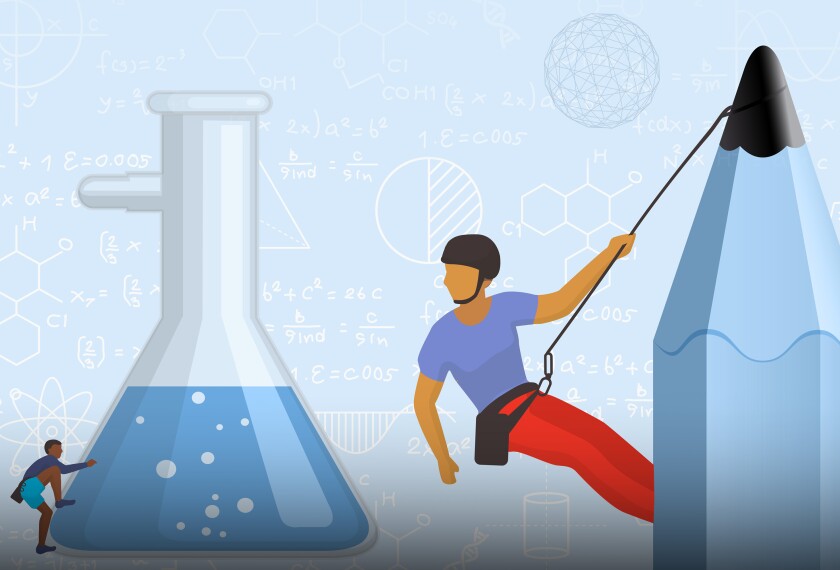Concerns have been rising about American adults’ lackluster understanding of science and declining trust in scientists.
found that the share of Americans who say science has had a mostly positive effect on society has fallen, and there’s been a continued decline in public trust in scientists.
69��ý’ scientific knowledge is also a source of major concern. A little more than 1 in 3 students in grades 4 and 8 and fewer than 1 in 4 high school seniors performed proficiently on the most recent National Assessment of Educational Progress in science.
In most, if not all, state standards for K-12 science education, students are expected to learn how to obtain, evaluate, and communicate scientific information. Yet, science educators know they’re competing with the influence of social media and students’ families and friends. A found that young people who used TikTok the most had a hard time correctly answering questions such as “Is astrology a science?” or “Is the Earth flat?” and that TikTok users have low trust in science.
At , a group of science educators and media-literacy experts came together to answer this question: What should students learn in K-12 science classes to help them better evaluate scientific information and resist accepting scientific misinformation?
They concluded that students need to leverage media-literacy skills so they can find trustworthy scientific information. This means learning what makes a source credible, how scientists develop reliable knowledge about the world, how scientists are willing to change conclusions as they receive more evidence, and how to be aware of their own biases regarding scientific information.
In an interview with Education Week, Courtney Capozzoli, a high school environmental science teacher in the Watauga schools in North Carolina and one of the educators who attended the conference, discussed how and why she incorporates media literacy into her lessons.
This interview has been edited for brevity and clarity.
When did you start incorporating media literacy in your lessons?

I came into the public school space from the college level, where I taught in the sustainable-development department. I started in public school at the time that [Donald] Trump was elected and I just felt astonished that we’re still talking about whether climate change is real and getting rid of the [U.S. Environmental Protection Agency] and all of this talk. I was noticing how the students were coming into the classroom repeating what they’d heard at home or on the “news.” That’s kind of where it started. I talked to my students about this and, over time, I’ve developed how I approach it in the classroom. But we don’t convince anybody by telling them they’re stupid or their information is wrong. That’s not how we change minds.
How are you approaching media literacy in your classroom?
I start with a topic that’s not controversial. I teach them how to look for evidence to try to figure out who’s behind a policy that might either hide information from us or confuse us about the information.
I do a lesson on landslides because landslides are not controversial. In North Carolina, there’s a story where there were these eight geologists who were tasked with mapping where landslides occurred in the mountains of North Carolina, and that funding was pulled. The students were tasked with figuring out why. It doesn’t cost a lot of money. It’s for the public good. Wouldn’t you want to know if the land you were on was risky? [The students found out] the real estate industry doesn’t want you to have access to this map.
Then when we get to the discussion of fossil fuels and climate change, I ask them a similar question: Who has something to lose financially if we all agree that burning fossil fuels leads to climate catastrophe? [We look at documentaries], I give them a whole list of websites—everything from the Cato Institute [a libertarian think tank] to NASA, and they have to try to figure out if it’s climate science or climate spin. We talk about lateral reading, where you can’t just trust what a website says about itself, you need to look at what other websites say about that organization.
[69��ý say] “Oh, this is so fun. I feel like a detective and I’ve never thought about it like this.”
What other feedback have you heard from students?
69��ý talk about how it can be frustrating to be around or to have people in their close circles that maybe aren’t interested in scientific evidence, and I’m like, “Well, you’re not going to convince them otherwise by telling them they’re stupid, but you can continue to offer information, and they can choose to listen or not.”
Has there been a change in how much influence misinformation has had on your students?
In regard to climate change, I feel like it is very rare nowadays. I would say overall around the environmental science side of things, I feel like there’s been an improvement—less misinformation. I know that’s not true across the board, but we’re in a better place than we were six years ago. Who knows what’s going to happen? It’s an election year, and I don’t know what kind of nonsense is going to be widely shared about environmental things.
Do you have advice for other science educators looking to incorporate media literacy?
I don’t know how to make other teachers want to do the practice without a mandate and, at the same time, I don’t think adding more mandates to teachers will result in the best outcome. It’s a great practice for teachers to be doing in the classroom. I have a feeling that there’s a whole lot more teachers doing it, even if they’re not calling it that. I think every science teacher is familiar with the claim, evidence, reasoning model or framework. Asking students to find evidence and consider the source and making it a regular part of the day or a part of the week is just a really valuable tool for the students.







